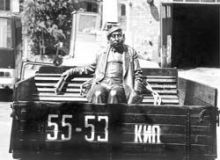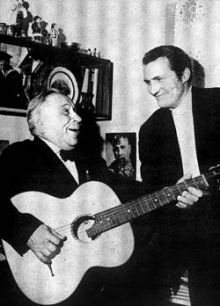Ukrkinokhrnoka Studio’s new release, Another Life or Escape from the World Beyond, stars Vasyl Basha, Inna Kapinos, and Iryna Melnyk, and is directed by Volodymyr Artemenko (script by Vira Melnyk; director of photography: Vitalii Zymovets). The film is about the difficult life of the extraordinary actor Mykola Yakovchenko and contains some facts from the famous comic’s biography.
Although Yakovchenko died 32 years ago, he is still remembered and loved by many admirers. A statue of Yakovchenko and his beloved dachshund Fanfan was unveiled in a public garden in front of the Ivan Franko Drama Theater where he used to work. The place is always filled with people. Grownups sit on the bronze bench near the actor’s statue, and children like to pat Fanfan and pose for pictures next to him.
Yakovchenko was loved by the movie-going public as well as his colleagues. He was a great actor with many talents, a sincere, cordial, and witty individual, a born comic actor with the heart of a tragedian, and a master of character roles. To this day he is the subject of many humorous and sad anecdotes. Here is what the noted actor Oleh KOMAROV of the Russian Drama Theater told The Day about Mykola Yakovchenko:
Yakovchenko lived in the actors’ building at 2/1 Olhinska Street, Apt. 10. It was a large communal apartment where he, his wife Tetiana, and their two daughters, Iryna, the eldest, and Yuna, were given two comparatively large rooms after World War II. Next door was Merited Artist of Ukraine Yevhen Kokhanenko with his wife Maria Shulha and son Tosyk. They also had two large rooms. Ye. Ozhehovska, a very old actress of the Franko Theater, lived in a small 12-meter room in the building. She died shortly after the war, and the room was then occupied by Nonna Koperzhynska with her first husband and son Yevhen.
Yakovchenko’s wife Tetiana also died shortly after the Second World War. The tragic loss left him with two small daughters. He had relatives in Kyiv and they must have helped the widower, as did his neighbors. But there was little they could do in those hungry postwar years, when people could barely make both ends meet.
My mother, Hanna Nikolenko, and Tetiana were good friends, so after her death Mom tried to help the poor girls as best she could.
Yakovchenko spent his youth in Pryluka, Chernihiv oblast. My mother was born in Pryluka, and she told me that when she started working for the local drama company, the comedian Mykola Yakovchenko and the “heroic” actor Petro Shypenko, both of whom had made their names in the town, used to attend their rehearsals and watch their plays.
Yakovchenko had a hard time coping as a widower. Lacking his wife’s warmth and her care for the children, he tried to find consolation in the bottle.
I remember that after Mykolaivska Street was rebuilt after the war (today: Horodetsky Street), there was the Teatralny Restaurant, which Yakovchenko frequented. He would approach a table and address the diners jokingly:
“Please treat Merited Artist of the Republic Mykola Yakovchenko to a hundred grams of vodka.”
People would laugh and say:
“What do you mean a hundred grams, Mykola Fedorovych? Sit down with us!” They were happy to be in the noted actor’s company. They treated him to food and drinks and listened avidly to his stories. They would remember this evening long afterward. Yakovchenko’s daughters, however, hated such occasions because they were old enough to realize that his behavior was bad for his image and the company’s, so they kept some of his clothes under lock and key.
I remember one summer morning when I was eight years old. I was wearing short pants and was just leaving our communal apartment (# 11). The door across the landing opened wide enough to show Yakovchenko’s head, who whispered conspiratorially:
“Oleh, give me your pants, there’s a good boy...”
There were many stories circulating about actors at the time. There were also stories about Yakovchenko. One time, on a film set the director assigned someone to make sure the actor had nothing to drink before his scene was shot. The man didn’t leave him for a second. Finally, the actor was sitting in the makeup room, being prepared for the scene. The preparations were completed and the director called out:
“Mykola Fedorovych, are you ready?”
“Rrrread-dddy,” said the actor, barely able to pronounce the syllables.
Another time, an ambulance team picked Yakovchenko up after he had had one too many and failing to detect a pulse, they took him to the city morgue. He woke up the next morning and sent the orderlies on duty running, scared to death by the “corpse” that had come back to life and was staggering toward them, demanding his clothes and saying he was late for rehearsal.
One day, looking at himself in a mirror, Yakovchenko said gently while caressing his face:
“Ah, you little mug, my dear breadwinner!”
Once during a concert the emcee announced: “Merited Artist of Ukraine Mykola Yakovchenko.” The actor slowly walked out on stage and informed the audience in a stage whisper, “They nominated me for ‘People’s Artist.’” The laughter in the hall was deafening. He became a legend during his lifetime. People traded stories about him. He was invited to concerts and passersby smiled at him.
Meanwhile his daughters grew up. Yunochka got married. Mykola Yakovchenko stopped drinking and finally received a private apartment on what was Brest-Litovsky Avenue. He lived there with Yunochka, her husband Volodymyr Bolhonko, the director of the popular radio show “From Saturday to Saturday,” and their son.
Yakovchenko had a room of his own and was respected and loved by the family. They idolized him, as evidenced by the many photographic portraits in the apartment, the funny family tapes, and the words by which he is remembered.
His work in the theater and films brought the actor immense popularity, especially in his twilight years. He became a true People’s Artist of Ukraine. He was instantly recognized and warmly greeted everywhere. Mykola Yakovchenko was an extremely spectacular actor, an actor by the grace of God.
I remember that excellent scene with him and Polina Niatko in Oleksandr Korniichuk’s Kalynovy Hai:
“Madam, I am a sailor. I’ll seat you in a gondola and take you to the reeds. I’ll make you see diamonds in the sky,” was how he confidently courted the affected, otherworldly Aha Shchuka. The paradoxical polarity of the two characters and spectacular individualities produced a strikingly comic effect.
Or take his Dovhonosyk character in Korniichuk’s In the Steppes of Ukraine! Although he was a negative character, he was so alive, direct, and even attractive that when we children watched the show, we felt sorry when he sang his closing lines, “I’m on my way and will spend years away” and was escorted off the stage by the militiaman Redka. Or his funny father of the hero and heroine in the comedies Maksym Perepelytsia and Mykhailo Starytsky’s Za dvoma zaitsiamy (the latter has become a film classic) which added to his popularity.
It was no coincidence that the statue of Yakovchenko and his dog Fanfan was unveiled in the public gardens opposite the Franko Theater. He often visited the place. This statue is a manifestation of public respect and the project was an excellent idea. If only his lips formed his usual kind and infectious smile, instead of sticking out like a caveman’s, the sculptor would have perpetuated his name. Yakovchenko was popular not just with viewers but with ordinary people. I remember watching him take his Fanfan for a stroll on Ivan Franko Square. He would immediately be surrounded by a crowd of children, who followed him around. I could hear something like:
“Mykola Fedorovych, what does your Fanfan eat?”
“Fanfan is a smart doggy. He eats everything he can grab, even nails (children’s laughter).”
What he loved most of all was to make people laugh and brighten their mood. He was an actor on and off stage. Wherever Yakovchenko went, there was a laughing crowd.
I remember his appearance on “From Saturday to Saturday” as Cossack Mamai, and his opening line: “My good ladies and gentlemen, I salute you!” The way he spoke made everyone smile.
At parties many actors sought to mimic Yakovchenko when they recounted their stories. Even such distant echoes in actors’ stories lifted listeners’ spirits. He turned practically everything he did, be it improvised scenes with Fanfan in front of children or asking for money to buy a hundred grams in a restaurant, into theater. And this theater was brilliant, interesting, and talented, just like him.
I was good friends with Volodymyr Bokhonko, Yakovchenko’s loving son-in-law most of our lives. After his death I often visited his parents. His father Borys remembered how he and Yakovchenko went to the Park of Glory. Yakovchenko was constantly greeted by passersby. A girl walked up to him and gave him a bouquet of flowers.
He was an actor even when he said what turned out to be his last words. When he was being prepped for surgery, he said, “The clown is off to the ring.”
When Bokhonko made the terrible decision to take his own life, he was looking at Yakovchenko’s portrait. In the presence of a female acquaintance he said: “See you soon, Mykola Fedorovych, see you soon, Yunochka!”
“What are you talking about? The operation went very well. The doctors say you will live,” a female acquaintance argued.
“OK, go to the kitchen. There is an interesting newspaper article on the table. Read it and I’ll get some fresh air on the balcony.”
She went to the kitchen. That was the last time he relaxed, on a ninth-floor balcony.
(This article was partially based on fragments from Oleh Komarov’s memoir Theatrical Reminiscences: Stories.)








